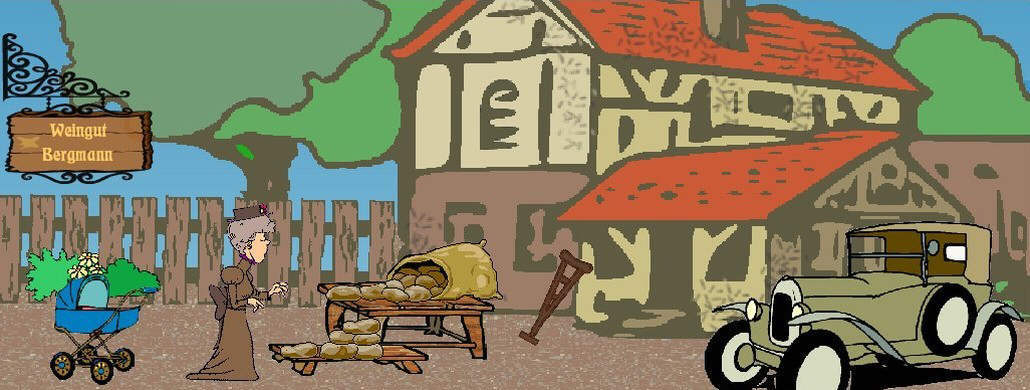
[Rhineland, 1918] Millions of soldiers had fallen, hundreds of thousands of people had starved to death, and the young republic was struggling against crushing burdens. There was much hunger, housing shortages and pauperization.
Supply in “Stübchen”
“So, darling, here is a bit of parsley and a few jars of rose jam for you!” Lottie put her box on the counter of the “Stübchen”. “Parsley has iron, and rose hip has vitamin C.” Kathi marveled … where did her mother get her strength from? Lottie Bergmann, born Countess Charlotte Csabany, proud owner of one of the finest vineyards in the region. But during the last few years, she had been digging in the earth, planting, harvesting and doing the hardest work to provide for her people. Kathi looked at her mother. She was emaciated, her hands testified to hardwork, and grey streaks ran through her hair. But nothing could harm her natural poise and dignity.
During the war, the blockade had prevented the import of foreign wines, so that the demand for German wine was soon greater than the supply. Moreover, the vintages of 1915 and 1917 were outstanding. They had sold well, but not raised their pricess like other businesses. Instead, they had financed their soup kitchen with the income. In their “Stübchen,” Bergmanns simply wanted to help alleviate the worst of the hardships. Hundreds of people died every day from malnutrition, tuberculosis or other diseases. Especially the children suffered. Many people still stood in line for hours in front of grocery stores and at soup kitchens. Often enough, the struggle for bare survival led to crime.
Invalids
Many families had lost loved ones. More and more invalid men were now returning one. On the streets and roads, one saw men without arms or without legs, who laboriously got around with the help of a little wooden stick, and men who were missing parts of their faces. Only few prostheses were available. Traumatized people who had suffered a “nervous shock,” for example by the near detonation of a shell, and sometimes shook uncontrollably all over their bodies. Only very few of them got proper therapy. Kathi could hardly imagine what the war had done to the souls of the soldiers. Seeing all this disgrace, her father was almost one of the lucky ones.
A small revolution with the sewing needle
Before Kathi could ponder further, the door opened again, and now her father Matthias came in, fully loaded with all kinds of fabrics. “The hotel on Mount Petersberg sorted them out,” he said, “maybe Helene can do something with them.” Helene, an elderly lady, was one of the seamstresses who had found shelter in the parlor during the war years, and could at least earn a little money. Already she came out of the working room and looked at the things Matthias had brought. There were damaged bed sheets, tablecloths that one could not get clean, small rugs that were no longer usable because of smoke holes. “I guess it’s not much,” Matthias said regretfully.
“Cheer up,” Helene said, and suddenly a tremendous energy emanated from her. “We’ll take the good parts and put them together. Who says patchwork dresses cannot be pretty? And from these rugs here … hmm … they’re a little thin, but they will make hats and caps out for the children. Of course, milday, one cannot compare them toyour mother’s gorgeous creations, but they should keep our children’s ears warm in the winter.”
All around looked at her, all amazed. A small revolution with the sewing needle, that’s what the little elderly lady with the Wilhelmine-sounding name and the Wilhelmine-like hairdo had just suggested. “However, normal needles won’t work, hmm .. ” “Don’t worry, our Walter will fix that,” said Lottie, besides herself with joy, “he has many technical skills, and please don’t call me milady.”
Don’t give up hope
Then Lottie turned to her daughter. She knew that Kathi and Max wanted to get married. But how could they celebrate lightheartedly when there was only hardship and misery everywhere? “Don’t give up hope,” she said, “Max has a job with the railroad, that’s worth a lot. You are young, you’re in love, you’ll make it through! Now that the Susan is fully back on board in the “Stübchen”, you can finish your education to be a winemaker. You already know everything.Then you’ll both have your degrees. Who knows what’s going to happen here.” Kathi smiled. Yes, the next few years would be very hard for all of them. But the strength they gave each other would get them through.
Meeting Joscha again
Some months later they finally met Lottie’s brother Joscha again. He looked tired and worn out, but also happy to see his family and friends on the Rhine again. Marie was overjoyed. She and Joscha were fond of each other, and their correspondence during the war years had forged a strong bond between them.
Now they walked along the banks of the Rhine and enjoyed their short time together before Joscha went back to Hungary. “We are defeated, our Austro-Hungarian monarchy no longer exists,” Joscha said sadly. “No one will receive us with open arms and red carpets. Do you really want to spend your life with a not-so-young diplomat who does not even know where he belongs?” Marie pointed to the place where once the berth of their beloved Rhine steamer “Aimée” had been, and tears came to her eyes. “You see, our ‘Aimée’ cruised the Rhine for Germany and for Alsace-Lorraine,” she said. “In her own way, she too was a diplomat. We must help our countries to live together in peace again. Papa, Hans and your parents would be very disappointed if we didn’t. And I would love to spend my life with you.”
Countess Marie Csabany
Now you will say that it is too dangerous, and I know about the political turmoil in Hungary, but I want to go with you! Mama wanted to accompany Papa on this last dangerous trip on the ‘Aimée’, only because of me she didn’t do it, Papa had urged her not too. She will understand very well that I want to be with you now. And she is not alone, she has the very best friends around her and Jacob, who loves her like a daughter, and we are not on the other side of the world.”
A few days later Marie and Joscha, Susan, Lottie and Matthias left for Hungary. Joscha and Marie would get married in a private wedding ceremony at the Csabanys’ country estate. Lottie and Matthias had insisted on accompanying Susan. “For all the joy of Marie’s and Joscha’s marriage, you’ll probably feel lonely on the way back without her” Lottie had said. “I know it was sad for my Mama when Papa was transferred to Galicia on disciplinary grounds, and she rarely saw him. Your parents went with her then, and now we’re going with you.”

Be the first to comment